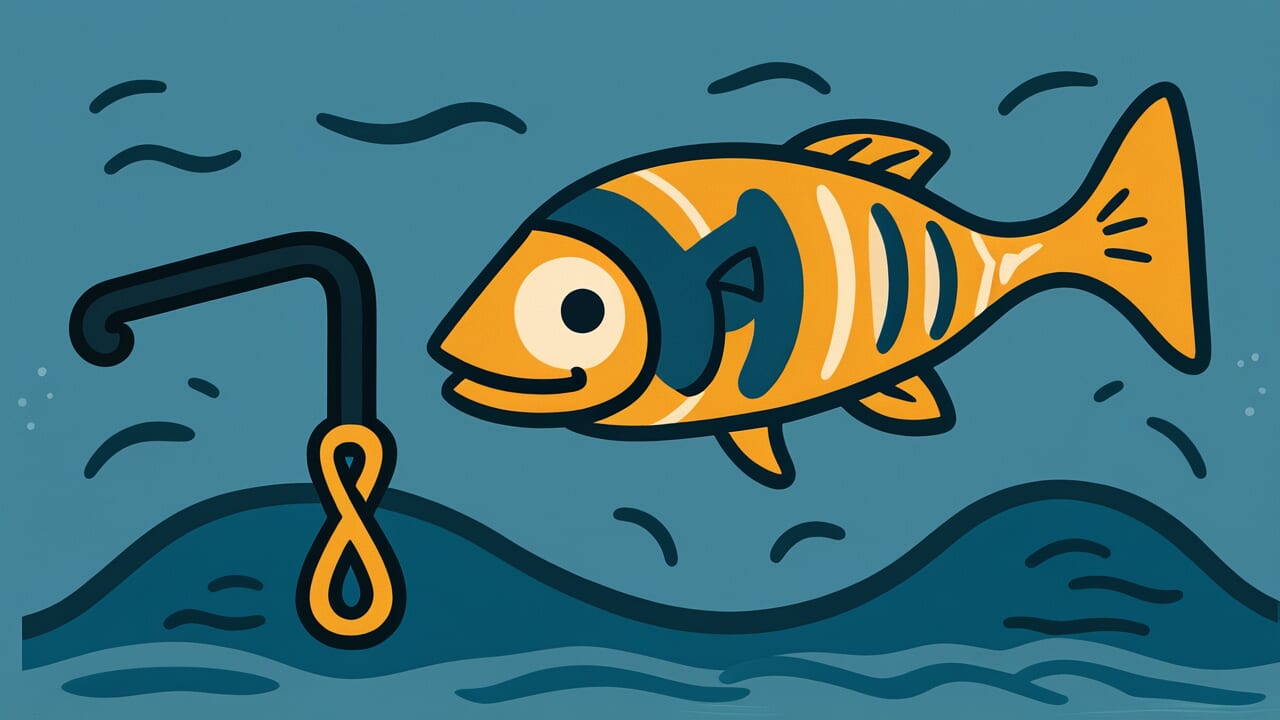How to Read “The fish that swallows the hook regrets not enduring its hunger”
Donkō no uo wa ue wo shinobazaru wo nageku
Meaning of “The fish that swallows the hook regrets not enduring its hunger”
This proverb warns against the foolishness of taking risks for immediate gains. It describes a fish that cannot endure its hunger and jumps at bait.
The fish swallows the hook hidden inside. After being caught, it regrets: “If only I had been patient back then.”
We face similar situations in daily life. We jump at sweet offers or attractive deals. Later, we realize they were traps.
This is when the proverb applies. People often use it to describe situations involving scams, fraudulent business schemes, or risky investment offers.
The key point is not just being deceived. The proverb emphasizes the failure to control one’s own desires and impatience.
Like the fish that could not endure hunger, humans cannot resist immediate benefits and jump into danger. This proverb expresses both that foolishness and the regret that follows.
It contains deep insight into human nature.
Origin and Etymology
This proverb likely comes from ancient Chinese classics. “Donkō” means swallowing a hook.
It describes a fish being lured by bait and swallowing the hook along with it.
Fishing has been deeply connected to human life since ancient times. Fish cannot endure their hunger and jump at the bait before them.
But a hook hides inside that bait. Once swallowed, there is no escape. Through the image of this fish, the proverb warns against human foolishness.
The expression “not enduring hunger” is important. “Shinobu” here means to endure or bear something.
The structure shows the fish lamenting its inability to endure hunger. After being hooked, the fish regrets: “If only I had endured my hunger, this would not have happened.”
This expression connects deeply with the concept of “controlling desires” in Chinese philosophy. Confucianism and Taoism teach the importance of self-control rather than being swept away by desires.
Using the familiar image of a fish, it visually conveys the danger of giving in to immediate desires. This excellent lesson was transmitted to Japan and came into use there.
Usage Examples
- Jumping at a money-making scheme and falling for fraud—that’s exactly “The fish that swallows the hook regrets not enduring its hunger”
- I signed the contract in a rush without checking the conditions, and now I understand what “The fish that swallows the hook regrets not enduring its hunger” means
Universal Wisdom
This proverb has been passed down for hundreds of years because it brilliantly captures a fundamental human weakness.
Even when our reason understands danger, our judgment becomes clouded when desire grows strong.
A hungry fish jumping at bait perfectly mirrors impulsive human behavior. When we are calm, we know “such a good deal cannot exist.”
But when we are desperate or anxious, that judgment disappears. When what we want is right before us, we cannot see the risks.
This may be a biological weakness related to how the human brain works.
What makes this proverb even deeper is that it describes the structure of regret itself. The fish only realizes it should have been patient after being hooked.
Humans are the same. After failure, we regret: “If only I had stayed calm back then.” But it is already too late.
This “irreversibility” is the harshness of life. The proverb teaches that this is precisely why self-control beforehand is so important.
Our ancestors knew that humans are creatures who repeat the same mistakes. That is why they left this warning in such a vivid image.
The fish’s regret may be our own future regret.
When AI Hears This
When we analyze the moment a fish swallows a hook along a timeline, a surprising mathematical pattern emerges.
Behavioral economics experiments show that humans choose “10,000 yen today” over “12,000 yen in one year.” They pick immediate money even though waiting offers 20 percent annual interest.
But when the same people compare “10,000 yen in five years” versus “12,000 yen in six years,” they calmly choose the latter.
Future value can be evaluated correctly when distant. But as it approaches, it appears to inflate rapidly. This phenomenon is called hyperbolic discounting.
For the fish, the bait before its eyes equals “today’s 10,000 yen.” The stronger the physiological pain of hunger, the more sharply this discount rate rises.
Research shows that hungry humans make impulsive choices up to 40 percent more than when full. The fish’s inability to endure hunger is not weakness of will.
The brain’s reward system is programmed to exponentially overvalue benefits that are temporally close.
What is interesting is that this proverb says “regrets not enduring its hunger.” The fish regrets after swallowing the hook.
As time passes and death approaches, the value of “the future where it did not eat the bait” suddenly becomes clear. This is exactly the same cognitive mechanism humans feel when facing loan repayment deadlines or diet failures.
Lessons for Today
This proverb teaches us the importance of having courage to face our desires. Investment schemes on social media, limited-time sales, contracts demanding immediate decisions.
Modern society overflows with mechanisms that stimulate our “hunger.”
What matters is recognizing when you are in a “hungry” state. When you are short on money, feeling lonely, or carrying anxiety.
These are exactly the times when your judgment is clouded. Develop the habit of pausing and thinking: “Right now, I might be in the same state as a hungry fish.”
Also, reconsider the value of waiting. Sleep on it, consult someone you trust, confirm conditions in writing.
These small acts of “patience” protect us from big regrets. Fish move by instinct, but we have reason.
The moment to use that reason is precisely when desire becomes strongest. You have the power to pause.
Trust that power and have the courage to take a breath.



Comments